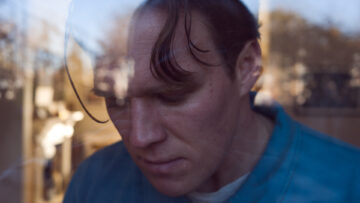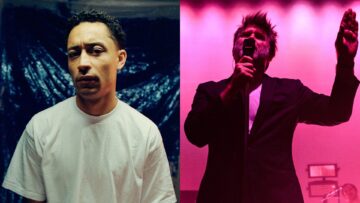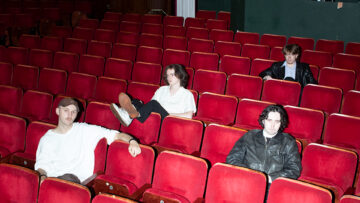

“I f***ing hate being under my real name,” says Jordan Stephens, jokingly. “Nah, actually, I like it at points. I was always going to be Jordan-something, but a variation of Jordan Stephens. Then I had this urge just before this EP was released, like ‘man, I just need to stop f***ing about’ because I’m actually proud of all the things I do. I’m actually f***ing proud of Rizzle Kicks – we smashed it and the albums are dope.”
This is a taster of the barefaced frankness of an artist who has, for the first time, produced music under his real name. Though Rizzle Kicks – the Brighton-born hip-hop darlings of BBC Radio 1 and the like in the early 2010s – never officially disbanded, Stephens had gone on to produce music under the names Wildhood and Al, the Native since 2016. The duo’s other half, Harley Alexander-Sule, has meanwhile been resembling an old soul legend under the alias Jimi Charles Moody.
“I realised it was just a lot easier to be me. It’s a statement to myself, but it definitely comes with vulnerabilities because I don’t feel like I’ve had complete control over a perception of the name ‘Jordan Stephens’.
“When you become a popstar, it’s a different thing. It’s not the same as being a musician, it’s like a different jog. People have rights and access to you; the way people are with you and talk to you is different. You’ve got to smile all the time and it’s just wild. But now when I smile, I feel it. It’s not like an expectation. I feel like I’m starting fresh, genuinely.”
That newness and authenticity undoubtedly makes itself known in his new EP, P.I.G. (‘Pain Is Good’), which is, believe it or not, more than good. It’s excellent.

Free from the shackles of predictable pop music, this five-part EP is a smooth, sauntering celebration of an artist becoming increasingly at ease with himself. “For my own sense of warmth,” Stephens explains, “I just wanted to go into the studio and make music that I actually listen to. I realised that the uniqueness and individuality will come from my own approach, my own lyrics and my own delivery.”
“I was on quite a powerful ADHD med for a long time but I’m not on them any more, so my mind works differently. The way I think of words now is a lot slower, it’s not as complex. But now I feel,” he says, in reference to the tongue-in-cheek rapping of his Rizzle Kick days, “whilst it’s good to be creative with how you express stuff, simplicity is underrated. It’s important to make something clear as much as it is beautiful.”
Stephens uses this new, slower-tempo approach in P.I.G. to confront personal issues. ‘Teach Me’, for instance, the EP’s third track, with its serene Frank Ocean-esque guitar riff, explores boundaries in a relationship – giving head, to be specific.
But, inherent in the EP’s title, Stephens’ current state of openness and curiosity is the product of past pain. Towards the end of his time with Rizzle Kicks, and during the project with Wildhood, he took to drink and drugs – the all-too-common dependency for young stars coping with being under the spotlight. With Wildhood, Stephens was “sober for maybe one song” when making the album Vert.
“It was cliché. That’s why we took a break [from Rizzle Kicks], because I was mashed up. I was taking loads of drugs and was just f***ed. I was too sensitive for that environment at the time, at that age. I hadn’t quite rooted myself and that extremity of experience is dangerous for people – when put into that environment, they more often than not go off the rails.”

“But,” he continues, relieved to have come out the other side – to have extracted the good from the pain – “it showed me what I could do and allowed me to access another part of myself. I can now look back on that period and realise I was feeling f***ed because I was in a continuous cyclical depression.”
Thankfully, it would be from this dark place that something positive would arise. Matt Campion, a creative director who had previously worked with Stephens on a Rizzle Kicks video, was involved in a project to tackle the stigma around mental health (in collaboration with the NHS and YMCA), when he fortuitously heard the Wildhood track ‘Whole’. The song, Campion discovered, struck a chord with the project.
The following day, Campion phoned Stephens and asked him to draw a circle on his hand, in what would become the trademark symbol of the #IAMWHOLE campaign. As Stephens puts it succinctly, “Matt fell in love with that song and the rest is history.”
“I’m so thankful I was able to collaborate with the NHS to create a mental health campaign that could channel some of the s*** I had out of me, to get an opportunity for it to be used positively. Even at the start of the mental health campaign I was still a little bit on edge, but it was through the process of doing it that I’ve been getting better.”
#IAMWHOLE, though, has been far more than a help just for Stephens; it’s been one of the recent forces that’s put the issue of mental health firmly in the public consciousness – a fact recognised and mentioned by MPs in the Houses of Parliament.

“I had no plans for the campaign outside Brighton. I knew I could get a couple of my mates who were super famous to help, but who knew where it would lead? And then –” he pauses, without needing to list the 121 million people the campaign reached online and the ‘Music 4 Mental Health’ (M4MH) charity gig at The Roundhouse last year, which Ed Sheeran, Anne-Marie, Nothing But Thieves and others headlined “– it’s just been sweet.”
“I think we were always gonna need to open up discussions around mental health and the stigma around it because that’s just the reality we’re all facing. I happen to be one of those channels in which that pushback has found itself.”
“I’ve picked up a lot from the journey of course. But most of my education has come from my own s***. This is the other complex thing about having a campaign and bearing your soul: I’m still such a work in progress, as is everyone. I don’t think you’re ever not.”
Intrigued, I’m keen to ask how Zen Master Stephens goes about his own self-enhancement. “I really want to get into meditating more – that’s one thing, certainly. But I’ve been sober for a year and a half. When you have a mind like mine that’s not easy.”
“I’ve also done a lot of reading and listened to so many audiobooks and podcasts, it’s been unbelievable. I saw [the German-born spiritual teacher] Eckhart Tolle the other day at The Royal Albert Hall. He spoke for four hours and he’s actually f***ing funny – I wasn’t expecting that. I also rate a book called The Four Agreements [by Don Miguel Ruiz]; and really love this physician called Gabor Maté – he’s incredible and a lot of his research is really interesting.”

Given that Maté’s work focuses on addiction, among other things, it’s clear Stephens is putting in the hours to understand and move on from his days of dependency. The improvement of his own mental health is then a source of continual insight to advance his #IAMWHOLE campaign, which he says will soon lock in the headliner for its next M4MH (“I’m gassed. If this guy does it, it’s f***ing great,” though it remains a secret for now).
Creatively, Stephens now also works with the collective ‘SX WKS’ – “a bunch of creatives that are just f***ing cool”. But, more importantly, with the release of his new EP, he’s now “most excited about just getting more f***ing studio time. It’s now like ‘yo, I mean business, let’s do it’. I’ve got a session today – I’m gonna see what happens.” We can all eagerly await. Jordan Stephens, now under his own name, has music to give.




